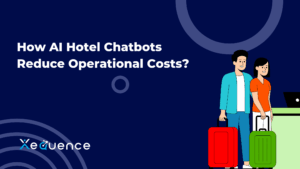- Home
- Artificial Intelligence
- How Gen Ai Can transform Hospitality Industry?
How Gen Ai Can transform Hospitality Industry?
- February 19, 2024
- Suraj Kumar
- Artificial Intelligence, Gen AI, Technology

Two decades ago, the general consensus on the uses of AI was that it would be used to replace humans in manual labor-intensive tasks. It was a wrong assumption as the robots need hands-on training. However, creative jobs were predicted to be least impacted, but quickly the idea changed as artificial intelligence is now supporting humans in creative endeavors. AI can write text, codes, original poetry, stories, and draw pictures of imaginary characters in a fraction of second. Interestingly, Generative AI has made all of this feasible. It forecasts trends within the pre-trained data and generates creative materials by predicting predicted responses.
What is Generative AI?
When an AI responds to commands from a user, it can generate a lot of things including texts, images, or other types of media. This is technically known as Generative AI. A form of deep learning called “GEN AI” uses artificial neural networks to process patterns that are more complicated than those seen in regular machine learning. Text-to-text, text-to-image, text-to-video, and text-to-task models are among the categories into which generative AI models can be divided, depending on the application. OpenAI’s ChatGPT, Google’s Bard, and Dall-E are some of the most reputed technologies in this regard. We, as common user, can access these services. Over the next decade, generative Ai could raise the global GDP by 7%.
Need for AI in the Hospitality Industry
Improving the guest experience has long been the hospitality industry’s main objective. Throughout the last ten years, we have seen a lot of technological improvements in this competitive market. Consumers can now use their mobile phones to do various tasks associated with the hotel sector. These include booking tickets, onboarding, and checking out. In addition, a multitude of use cases for any industry sector have been made possible by the introduction of blockchain, cloud computing, and IoT. These technologies also save money, reduce the amount of time that employees and customers contact, and increase customer satisfaction. For instance, using cloud services can remove the need of internal IT infrastructure, and IoT can completely transform how electrical equipment is maintained. Thus, it makes sense for anybody involved in the hotel sector to incorporate emerging Generative AI.
What are the key advantages of Generative AI in hotel industry?
Personalized Guest Experiences
AI in hotel industry to create highly customized visitor experiences is among its utmost advantages. For customizing anything from dining selections to room amenities, hotels can employ generative AI to assess guest data, preferences, and behavior. For instance, the AI system in a hotel can automatically assign the best room upon check-in if it detects that a guest wants a quiet room with a view, improving the guest’s experience overall.
Streamlined Operations
To maintain efficiency and streamline operations, generative AI has become a necessity in the hotel sector. Check-ins and check-outs, inventory management, and housekeeping schedules are just a few of the duties that AI-powered systems can automate. Therefore, operations run smoothly with less numbers of human errors and operational costs are minimized.
Revenue Optimization
Additionally, hotels can optimize their revenue streams with the help of generative AI. AI algorithms can suggest dynamic pricing methods by examining past booking data, market trends, and local events. This guarantees that lodging establishments can optimize their earnings by modifying room rates in response to shifts in demand, noteworthy occasions, or seasonal fluctuations.
Efficient Customer Service
Chatbots and virtual assistants driven by generative AI are now essential tools for hotels to offer effective customer care. These AI-powered systems are able to respond to a variety of 24/7 visitor questions and requests, ranging from ordering room service to making local recommendations. Consequently, guests receive prompt and hassle-free service, while hotel staff may concentrate on more intricate and customized jobs.
Is there any challenge is implementing Generative AI?
However, there are risks associated with any technology, and generative AI is no exception. In an effort to produce content that is similar, generative AI might magnify biases and mistakes by basing its outputs on previous training data. Because it requires a significant amount of infrastructure change and specialized knowledge, integrating generative AI into a business’s systems might be easier said than done. However, the possibility of opportunity costs and technical obstacles still exists. Furthermore, many visitors may worry about their privacy and morality while using generative AI to achieve customization.
It follows that hospitality companies looking to modernize its technology must be aware of the potential difficulties. The business may make sure that the outputs are accurate and impartial by monitoring the training data and trying to reduce biases and inaccuracies. An enterprise can manage brand distinction and the legality of recommendations provided by Generative AI by ensuring that training data is in line with its values and local regulations. And last, by teaching the AI morality and ethics, the company may cultivate a “Digital Empathy” for its clients.
There are more advantages than disadvantages to incorporating generative AI. Thus, rather than waiting to explore opportunities, firms would be advised to start utilizing best AI chatbots. The potential for generative artificial intelligence is astounding, even with the current state of technology. One possible application of generative AI is in providing virtual tour guides for clients by integrating with augmented and virtual reality technology. When this happens, it might be able to predict future requirements and desires in order to give them the finest recommendations and hyper-personalize hospitality services. One day, Generative AI might create original music that is in line with a brand’s mission statement, giving consumers an unforgettable experience that encourages them to visit other parts of the company more regularly.
The final words
The hospitality industry, especially the hotels are undergoing a change because of this version of artificial intelligence. It gives establishments new and creative methods to boost income, improve guest experiences, and optimize operations. The aforementioned use cases highlight the enormous potential of generative AI in revolutionizing hotel guest interactions and operational efficiency. We anticipate seeing even more innovative uses of generative AI in the hospitality industry as technology develops, which will further improve the entire visitor experience and make hotel stays more remarkable than ever. It is extremely helpful for the hotels that want to succeed in the era where meeting consumer needs comes first.
Recent Posts
Newsletter
Get regular updates on data science, artificial intelligence, machine
You may also like

AI Travel Assistants: The New Personal Travel Planners

5 Things an AI Travel Assistant Can Do in Seconds

How AI Hotel Chatbots Reduce Operational Costs?




